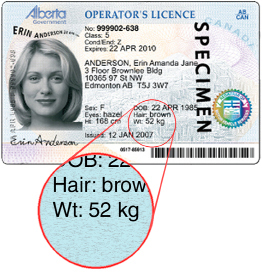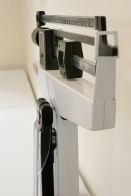Module 1
1. Module 1
1.17. Page 2
Module 1: The International System of Units (SI)
Get Started
Do you have an operator’s licence or a passport? If you do, take a closer look at either of these pieces of identification now.

© Alberta’s Operator’s Licence (2009 Design),<http://www.servicealberta.gov.ab.ca/
images/DriversLicence/proofing-new-v1.jpg> (Edmonton: Service Alberta, 2009).
(23 November 2009). Reproduced by permission.
Notice that your physical characteristics include SI (metric) measures for your height and weight. In the sample Alberta licence, what is Erin’s weight?
weight: a measure of the force of gravity on an object
mass: a measure of the quantity of matter in an object
In everyday conversation, people use the terms weight and mass interchangeably. The terms are related, but strictly speaking, weight and mass have different meanings. Your weight depends on gravity. For example, on the moon, where the force of gravity is less than on Earth, your weight would be less, but you would still be you—mass-wise.

© Stavchansky Yakov/shutterstock
The kilogram is a unit of mass, but it is commonly used to indicate weight. What is your weight (mass) in kilograms? If you have access to a bathroom scale, weigh yourself now. If you’ve been to a doctor’s office or health clinic, the scales there use a balance beam and are more accurate.